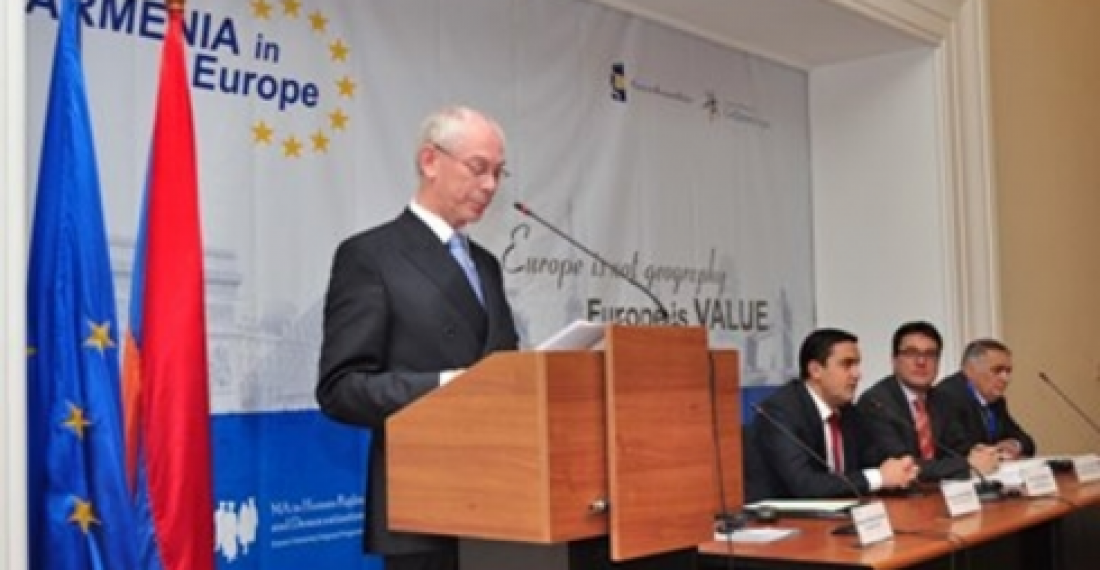The highest official of the European Union, President of the European Council, Herman Van Rompuy has addressed a meeting of the Armenian Parliament at the start of his official visit to the three South caucasus countries. Van Rompuy arrived in Yerevan last night and later today is expected to meet Armenian president Serzh Sargsyan.
In his address to the Armenian Parliamentarians Van Rompuy said,
"The benefits of the Eastern Partnership cannot fully be realized without a sustained effort to build stability -- stability between neighbours. Indeed, the medium to long-term goals of our future agreement make no sense if the threat of conflict is going to be a permanent presence in the background. But let me be clear: this is a reality and it has to be faced. The European Union will continue to insist that Armenia and Azerbaijan step up their efforts to reach agreement. The so-called Madrid Principles remain a valid basis for peace, in accordance with the commitments made by the Presidents of both your countries to France, Russia and the United States as co-chairs of the OSCE's Minsk Group. And we will continue to ask for unconditional access for representatives of the European Union to Nagorno-Karabakh and surrounding regions.
It was with great concern that I learnt about the recent serious armed incidents along the border between Armenia and Azerbaijan and the line of contact. I deeply regret the loss of human life. The clock cannot be turned back on these tragic incidents, but lessons can be learned. The European Union calls on both sides strictly to respect the ceasefire and exercise restraint, on the ground and in public statements, in order to prevent a further escalation of the situation. Threats and the use of force do not contribute to a resolution of this persisting conflict. The efforts of the Minsk Group and its co-chairs to seek a peaceful resolution have our full support. Where useful, we stand ready to provide extra assistance for confidence building measures. And once there is a settlement agreement the EU will be ready to help implementing it including with rehabilitation assistance."
Earlier, speaking to civil society leaders, Van Rompuy also discussed the role of civil society in supporting a peaceful settlement to the nagorno-Karabakh conflict. He said:
"Armenia’s fulfillment of its enormous potential, including in the political association with the EU, depends upon achieving medium to long-term stability and predictability. This can only be achieved by eliminating the threat of conflict, and addressing the consequences of previous conflict as well. Here also civil society has an important role to play, by encouraging and serving the peaceful resolution of the conflict over Nagorno-Karabakh. The assessment I have often received is that public perceptions, expectations and fears relating to the Nagorno-Karabakh peace process are disconnected from the interactions between political leaders at the negotiating table. Without fully involving that the societies affected by the conflict in the peace process, this phase of the negotiations could fail, with serious impact for long-term stability in the region."
He added:
"you have a vital role to play in the reform and peace processes of Armenia. My presence here today shows you, I hope, that at the very highest level in the EU we rely on you and we look to you for support. In all areas your help can make a crucial difference, in particular in monitoring commitments and results. We count on you to hold our upcoming bilateral agreement to the highest standard – its success depends also on your involvement"
source: commonspace.eu with europa.eu
photo: Herman Van Rompuy addressing Armenian civil society leaders in Yerevan on 4 July 2012 (picture courtesy of Armenpress)







